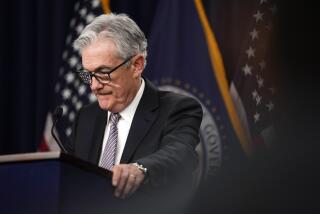Key Interest Rate Raised in Europe; Stocks Rally
- Share via
The European Central Bank on Thursday raised its benchmark short-term interest rate for the first time since 2000, although policymakers said the move wasn’t the start of a steady series of rate increases.
Those assurances soothed European stocks, which rallied sharply.
Still, the increase raised the prospect that the European Central Bank, the U.S. Federal Reserve and the Bank of Japan could be simultaneously tightening credit in 2006.
The European bank raised its benchmark rate to 2.25% from 2%, citing the need to restrain inflation pressures. The bank had telegraphed the move in recent weeks, but it still drew criticism from politicians and business executives, who said there was no good reason to boost rates.
“In a nutshell, it’s not the right decision, and we hope there will be no negative impact,” said Ernest-Antoine Seilliere, president of UNICE, a European business association.
The bank had been holding its rate at a six-decade low, even as the Federal Reserve had raised its benchmark rate to the current 4% from 1% in mid-2004.
Economic growth in Europe has lagged behind the U.S. expansion, but the jump in energy prices over the last year has raised concerns about inflation.
The bank Thursday lifted its forecast for 2006 inflation to 2.1% from 1.9%. It also boosted its estimate of 2006 real economic growth to 1.9% from 1.8%.
Bank President Jean-Claude Trichet said at a briefing in Frankfurt, Germany, that the rate hike was “in line with our duty to preserve price stability.”
But, he added, “we are not engaging in a series of interest rate increases.” Monetary policy would remain “accommodative” for the European economy, Trichet said.
Stephane Deo, London-based head of European economics at brokerage UBS, said he expected another quarter-point increase in March.
Some U.S. analysts are optimistic that the Fed might be nearly done raising rates, but many still expect one or two quarter-point increases in the first half of 2006. Some analysts say the Bank of Japan also could begin to tighten credit in 2006 if deflation fears continued to wane and the economy stayed strong.
Currency traders drove the euro down despite the rate hike, which normally would be expected to boost the currency. The euro fell to $1.173 in New York from $1.179 on Wednesday.
The dollar hit a two-year high against the yen, rising to 120.46 yen from 119.81.
European stock markets gained. A Bloomberg News index of 500 European blue-chip shares jumped 1.6% to a three-year high. Germany’s DAX index rallied 1.4%, the French CAC index rose 1.5% and the Dutch market was up 1.8%.
Stocks also soared in Tokyo, where the Nikkei 225 index topped 15,000 for the first time in five years, adding 258.35 points, or 1.7%, to 15,130.50.
*
Bloomberg News was used in compiling this report.
*
(BEGIN TEXT OF INFOBOX)
Central bank rates
The European Central Bank raised its benchmark short-term interest rate Thursday, but the rate still is among the world’s lowest.
Central bank benchmark rates
Australia:5.50%
Britain:4.50%
U.S.:4.00%
Canada:3.00%
Europe:2.25%
Japan:0.01%
*
Source: Bloomberg News
More to Read
Inside the business of entertainment
The Wide Shot brings you news, analysis and insights on everything from streaming wars to production — and what it all means for the future.
You may occasionally receive promotional content from the Los Angeles Times.










